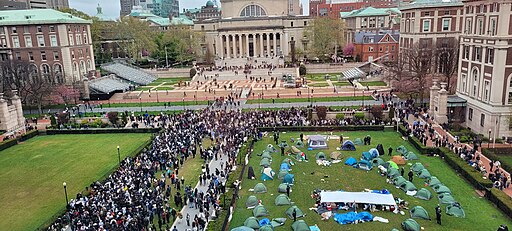
I’m too young to remember the campus convulsions of the 1960s, but older friends who were there tell me that the growing campus protest movement against US support for Israel’s war in Palestine bears a striking resemblance to those days.
I happen to support that movement’s goals, at least to the extent of wanting to see the US government butt out of other people’s arguments.
I’m told by some “pro-Israel” friends that the student protesters are all “anti-semites” and “supporters of Hamas,” and that if I support them I must also hate a particular ethnic group and support terrorism as a tactic.
But I don’t hate any ethnic groups, nor do I support Hamas any more than I support the Israeli Defence Forces.
I don’t doubt that SOME of the student protesters fall into the “hater” category, simply because the protests are a convenient bandwagon for “haters” to ride on. The next large political event I attend that doesn’t have a least a few weirdos hanging around, trying to grab a little unearned credibility by association, will be the first.
I just want a government that claims it works for me to stop handing out weapons and cash to other governments. Especially, though not only, to crybully regimes that constantly play the victim while also occupying territory outside their borders for decades on end, imposing apartheid regimes on the inhabitants of those occupied territories, murdering anyone who resists (along with many who don’t), etc.
To the extent that the kids on campus are seeking the same thing, they’re doing God’s work and have my full support.
Heck, I may even make myself a sign, see if I can find my old gas mask (just in case), and go hang out at the university campus nearest me this weekend if I’m feeling nostalgic (I’ve attended protests on and off for about 40 years, but not lately).
I consider the protests a positive sign to the extent that campus movements tend to be bellwethers.
The protests against the US war in Vietnam didn’t end the war, but they did presage wider popular opposition to the war, and 15 years or so of a general “well, let’s not do THAT again” temperament in America after it ended.
The campus movement to end US support for apartheid South Africa was also broadly successful and contributed to the fall of that vile regime.
Whatever your opinion of the Black Lives Matter movement, those protests (on and off campus) put cops on notice that they might finally be held accountable when they murder citizens.
These protests are probably the beginning of the end for a US foreign policy offering unconditional support to Israel. That’s a good thing.
Thomas L. Knapp (Twitter: @thomaslknapp) is director and senior news analyst at the William Lloyd Garrison Center for Libertarian Advocacy Journalism (thegarrisoncenter.org). He lives and works in north central Florida.
PUBLICATION/CITATION HISTORY


